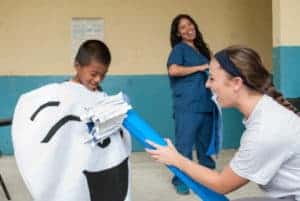HEALTH CARE ACCESS:
Even though Panama is a country with a lot of economic growth, this growth does not apply equally to all Panamanians, especially those in rural areas. This results in stark inequality when it comes to healthcare access. The Panamanian Ministry of Health (MINSA) provides two different types of health facilities throughout rural Panama: Centros de Salud and Puestos de Salud. Centros are the larger of the two, often found in municipalities, and typically have at least one physician on staff at all times with nurses and potentially a dentist. Puestos are found sporadically in rural communities and generally have a single nurse available.
Cerro Negro has a Puesto de Salud or Health Post where they can get basic medical aid but need to travel to the closest corresponding Centro de Salud is in Los Ruices, about 5 KM away, which costs about $2 by bus if they want to make an appointment to a specialist. The most common illnesses seen within the community are diarrhoea, fever, common cold, and arthritis.


